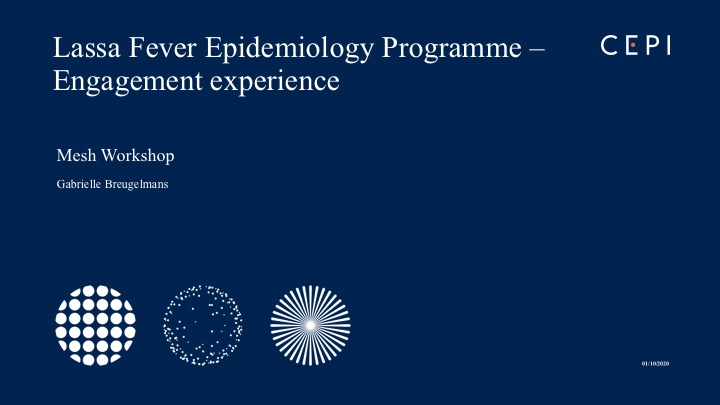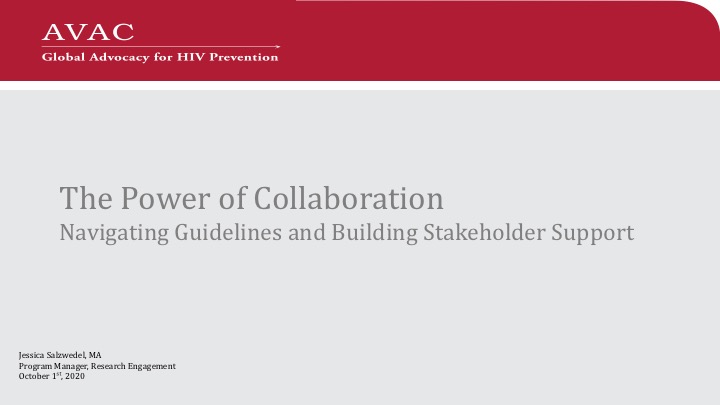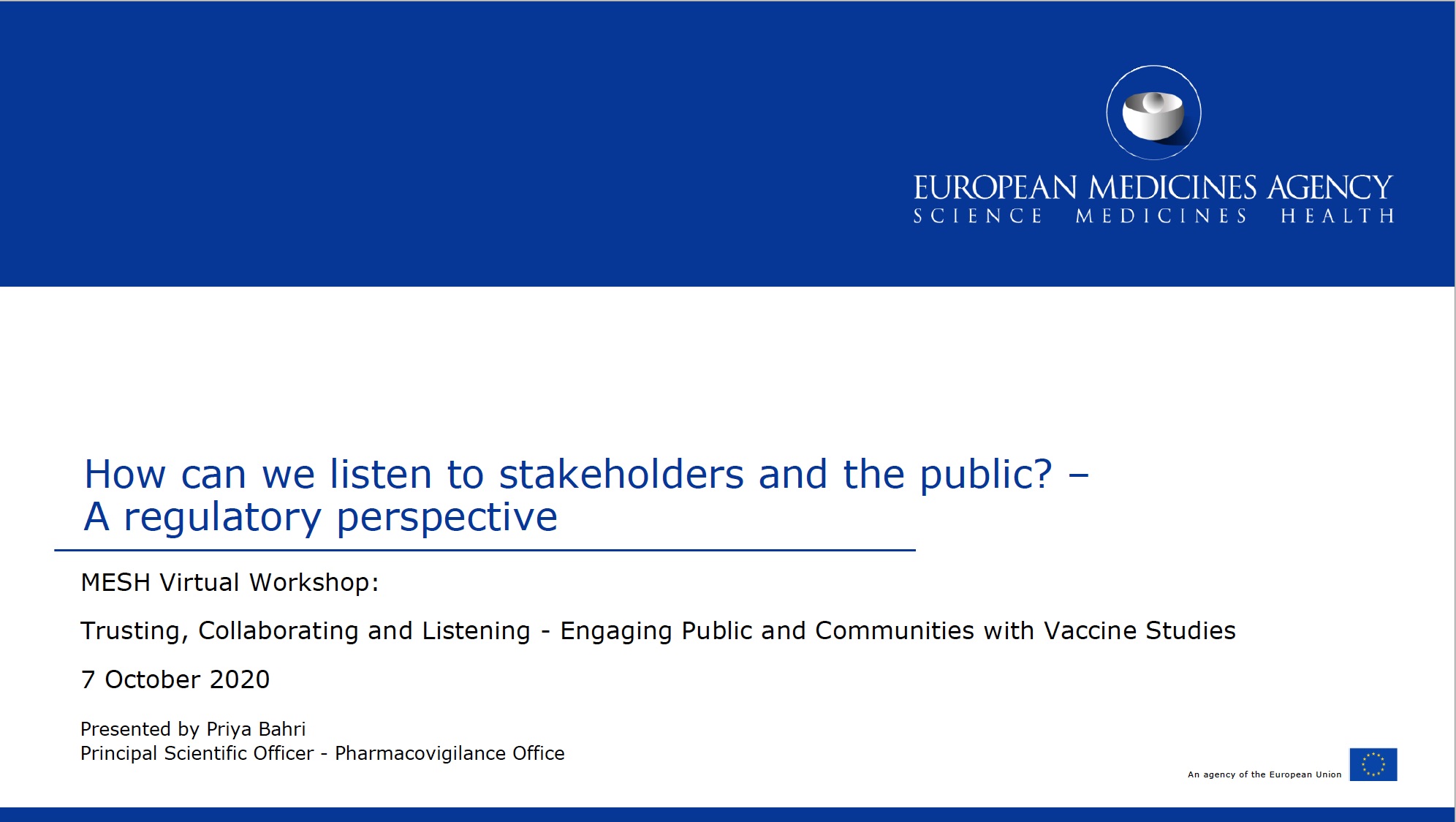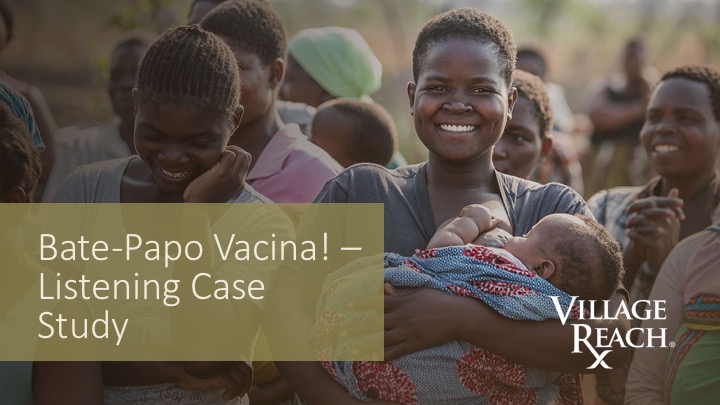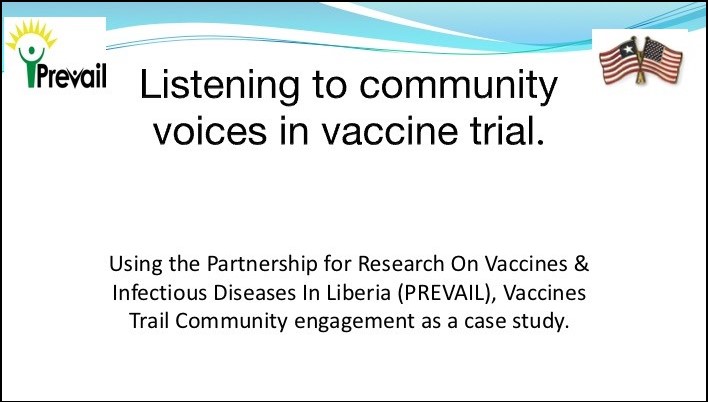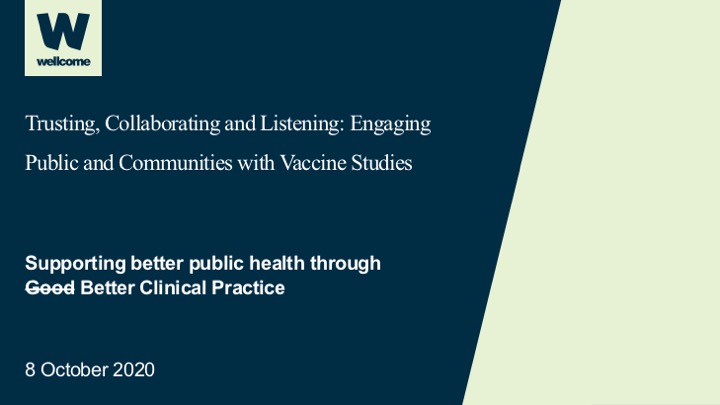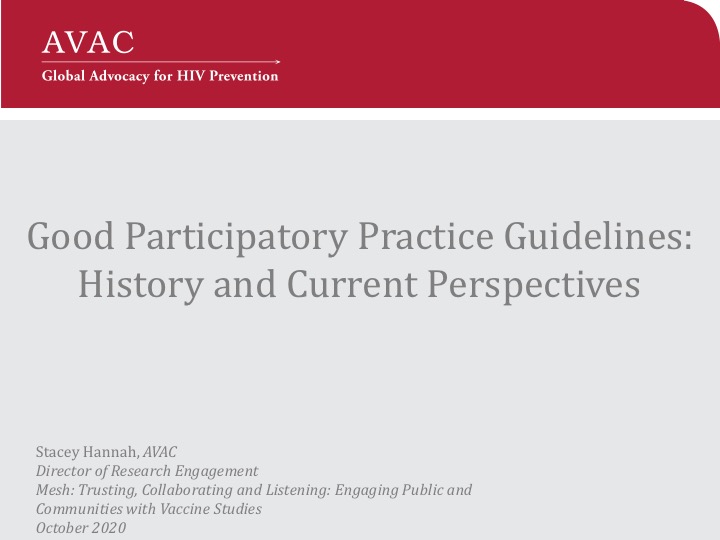Supported by Wellcome Trust | September & October 2020
Workshop Design: Siân Aggett Workshop Facilitator: Robin Vincent
SESSION 4: SUPPORTING STRONG PRACTICE
BACKGROUND
Globally our attention is turned to COVID-19 and our hopes are pinned to the quick discovery and availability of a vaccine. Community and public engagement will be central to delivering this vision. Not only in securing uptake once an effective vaccine is identified, but earlier in the process of research and development itself which will be where this workshop had its focus.
This closed-group workshop was divided into four sessions, each with a loose overarching theme chosen to enable participants to unpack some of the complex historical, social and political context around vaccine research and development. This was also connected to the practical realities, complexity and challenge of conducting meaningful engagement on the front line.
The workshop brought together delegates from varied institutions and roles, giving a forum for listening and learning from each other’s standpoints. This included front line trial staff, community liaison teams, trial managers, managers of funding programmes, communicators and researchers (from the social sciences as well as medical science) who shared successes and difficulties.
Vaccines and clinical trials have a long and complicated history. The workshop sought to explore and draw comparisons across a range of types of vaccines trials, within the context of epidemic diseases with humanitarian emergencies (Ebola, Zika, COVID-19) and those now considered as more chronic public health concerns (HPV, Polio, HIV). They may be associated with diseases surrounded by stigma and poverty or diseases that are fading in social memory (Measles in the UK). The contributors shared lessons they had learnt and participants compared and contrasted approaches, everyone working towards a greater awareness of the contexts in which they were working.
SESSION 1: TRUST
30 September 2020
Using ‘trust’ as a lens, this session reflected on the recent history of vaccine development at a global scale and on how this has both impacted upon and has been influenced by specific case studies. We framed trust as a relational problem, not a ‘deficit problem’ belonging to public or communities. We asked, who needs to take responsibility for public and community trust in vaccine development and research and how can we coordinate efforts to ensure trust between stakeholders is understood and nurtured?
This session included contributions from speakers who are using the concept of trust to frame their engagement activity and invited delegates to critically examine what breakdowns in trust might indicate and what that may mean for engagement practice.
Keynote presentation: Stuart Blume – Emeritus Professor of Science and Technology Studies at University of Amsterdam
Keynote presentation: Heidi Larson – Professor and Director, The Vaccine Confidence Project at London School of Hygiene & Tropical Medicine (LSHTM)
Mistrust group exercise
We used Padlet to turn things on their head and ask "How could we ensure a research project is mistrusted?" When we flip this back the other way, does it give fresh ideas for how to ensure good engagement and strong relationships? See the responses from participants on the Padlet by clicking HERE
Case study sharing - Peer Learning Style (breakout groups)
Welile Sikhondze – Technical Advisor & Research Coordinator at Eswatini Ministry of Health/NTP
Alun Davies – Social Scientist at KEMRI-Wellcome Trust Research Programme (KWTRP)
Maria Leticia Santos – Clinical Trials Operations Coordinator at Bio-Manguinhos/Fiocruz
Roderick Sambakunsi – Public Engagement Manager and Project Manager One for All at Mucosal Pathogens Research Unit, Malawi
Naho Yamazaki – Head of Policy and Engagement at Health Research Authority (HRA)
Reflection on key themes from the day: Alun Davies, Social Scientist at KEMRI-Wellcome Trust Research Programme
SESSION 2: COLLABORATION
1 October 2020
There is an increasing complexity of actors working in vaccine research. The N.G.O/humanitarian sector, the private sector and the public sector might all be collaborating on the same trial. Each can have their own understanding of what engagement ought to be, what conversation frames are important and who ought to be involved. In emergency contexts, multiple trials might be taking place concurrently within the same region. What challenges does this create for engaging local populations?
In this second session, participants looked at collaboration and engagement with vaccine trials. They explored aligning engagement across partnerships and similar geographic areas, heard about the synergies and distinctions between different roles such as communications, engagement and social research within the same trial site and touched upon ways in which trials can collaborate with communities themselves.
Keynote presentation: Gabrielle Breugelmans – Head of Epidemiology at The Coalition for Epidemic Preparedness Innovations (CEPI)
Related Resources
The Coalition for Epidemic Preparedness Innovations (CEPI)
Epidemic Preparedness Innovations (EPI) Knowledge Hub
Aims of engagement exercise
Participants were asked “The purpose of engagement with vaccine research is...?”. Below is a phrase cloud of the answers submitted on Mentimeter:
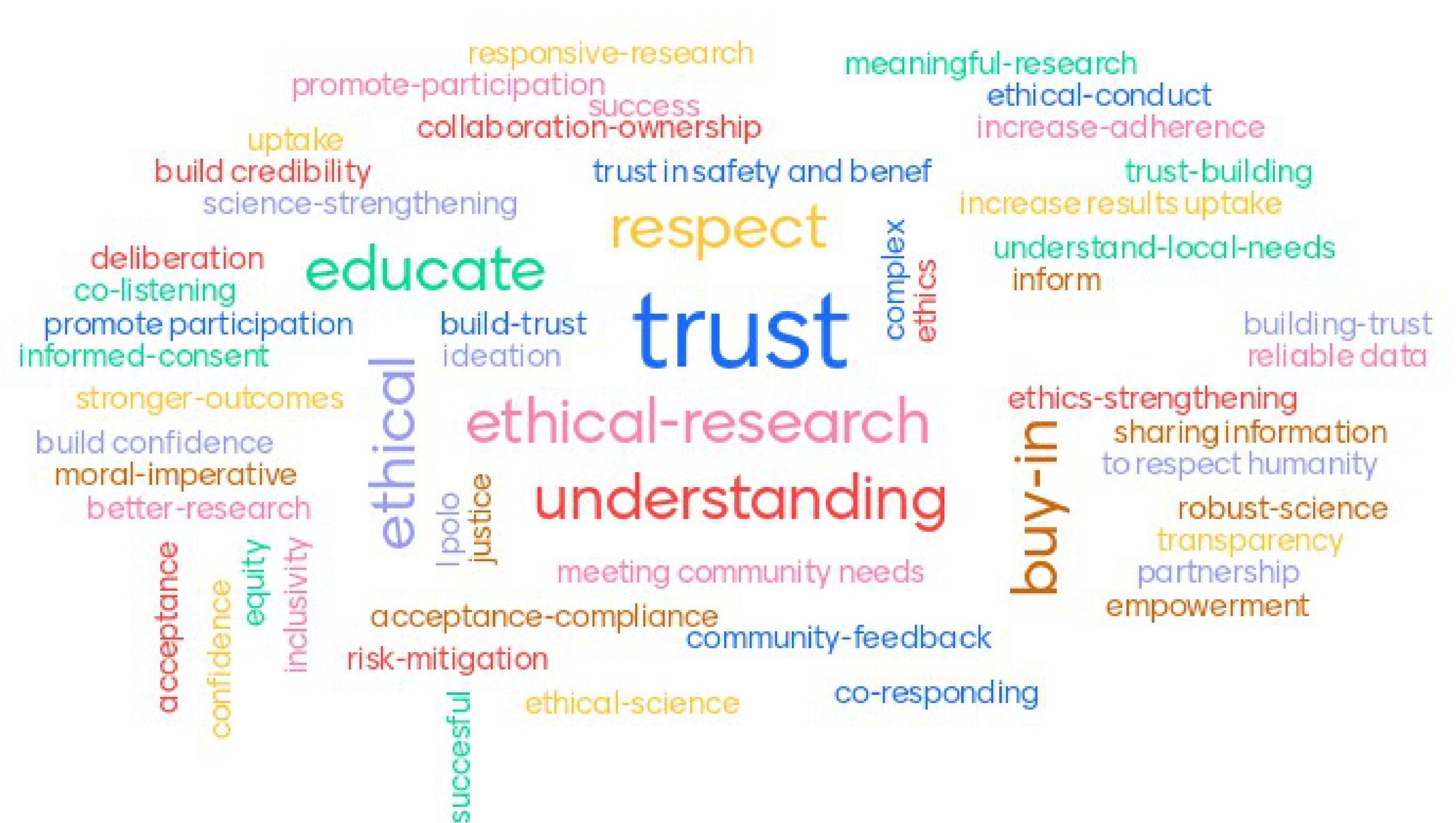
Reflecting on collaboration and Ebola vaccine trials
Chair: Mark Marchant – Research Fellow at London School of Hygiene and Tropical Medicine (LSHTM)
Speakers:
Luisa Enria – Assistant Professor at London School of Hygiene and Tropical Medicine (LSHTM)
John Johnson – Référent Médical Vaccination et Réponse aux Epidémies at Médecins Sans Frontières (MSF), Paris
Robert Kanwagi – Programme Coordinator at Ebola Vaccine Deployment Acceptance & Compliance Program/WV Ireland
Shelley Lees – Associate Professor at London School of Hygiene and Tropical Medicine (LSHTM)
Key actors in collaboration exercise
Participants worked in small groups to explore the key stakeholders or ‘actors’ for engagement work and why they need to be engaged. Below is a consolidated Jam Board which brings out ideas from different groups
Project Presentation: Jessica Salzwedel – Program Manager, Research Engagement at AVAC
Reflection on key themes from the day: Nancy Lee – Programme Director at Wilton Park
SESSION 3: LISTENING
7 October 2020
Engagement is often purported to be the way of ensuring that a study is context-sensitive and appropriately targeted. What are the sensory structures and feedback loops that are required to ensure that this is the case? At what stage in the research cycle does engagement need to take place? Through what channels and when might we expect to hear community and public voice?
During the third session, participants explored ways in which trials might create mechanisms to listen and respond to public and communities themselves. Presenters described how community voices are expressed and in what spaces (Community advisory boards, advocacy groups, public protest etc), ways to ensure that community voices might inform research processes themselves and whose responsibility it might be to continue relationships and conversations with communities in the long term.
Keynote presentation: Priya Bahri – Principal Scientific Officer at European Medicines Agency (EMA)
Reflections from Gill Black – Managing Director at Sustainable Livelihoods Foundation
Related Resources
Sustainable Livelihoods Foundation
Project presentation: Bvudzai Magadzire – Senior Technical Advisor at Village Reach
Project presentation: Patrick Faley – Social Mobilization Coordinator at Partnership for Research on Ebola Vaccines in Liberia (PREVAIL)
Related Resources
The Partnership for Research on Ebola Virus in Liberia (PREVAIL)
Discussion exploring the role of rumour:
Robert Kanwagi - Programme Coordinator at Ebola Vaccine Deployment Acceptance & Compliance Program/WV Ireland
Noni Mumba – Head of Community Engagement at KEMRI-Wellcome Trust Research Programme
Reflection on key themes from the day: Julio Canario – CEO at Etikos / Instituto de Salud Mental y Telepsicología (ISAMT)
SESSION 4: SUPPORTING STRONG PRACTICE
8 October 2020
In this final session, supported by the Good Clinical Trials Collaborative (GCTC), delegates heard from a number of different global organisations who have worked to develop guidelines, frameworks and toolkits which aim to support strong community and stakeholder engagement either within clinical research or for development practice and humanitarian action. These principle-based resources, and associated implementation tools, are often used by research teams in the design and conduct of new studies.
This session reflected on the resources that already exist in this space and explored how we can continue to encourage Good Participatory Practice (GPP) in clinical trials. What works and why? What might be needed and what lessons and opportunities might we capitalise on in developing future guidance? Our reflection on the day also included a call to action for collaboration on developing future support.
Introduction: Nick Medhurst – Policy and Advocacy Manager at Good Clinical Trials Collaborative
Keynote presentation: Beatriz Da Costa Thome – Universidade Federal de São Paulo (UNIFESP)
Related Resources
Report: Research in global health emergencies, Nuffield Council on Bioethics (2020)
Free eLearning course based on report: Research in global health emergencies: Ethical issues
PART 1: Supporting Participatory Practice in Clinical Trials: Adapting GPP Guidelines to contexts
Stacey Hannah – Director of Research Engagement at AVAC
Stephanie Seidel – TB Alliance
Lisa Schwarz – Professor at McMaster University and lead for WHO Task Force on Good Participatory Practice in Emerging Pathogen Research
Stacey Hannah - Presentation slides
Lisa Schwarz - Presentation slides
Related Resources
AVAC Good Participatory Practice (GPP) Guidelines
Good Participatory Practice Guidelines for TB Drug Trials (GPP-TB)
Toolbox: WHO R&D Good Participatory Practice for COVID-19 clinical Trials
Toolbox: Working with Community Advisory Boards for COVID-19 related clinical studies
Engagement Challenges and lessons learned
Participants were asked to add their own challenges and learning around using and adapting this kind of guidance on a shared Padlet which can be found HERE
PART 2: Supporting Participatory Practice in Clinical Trials: Other Approaches
Jim Lavery – Chair in Global Health Ethics and Professor at Center for Ethics, Emory University
Cathy Slack – Project Director at HIV AIDS Vaccines Ethics Group (HAVEG) at University of KwaZulu-Natal (UKZN)
Sharon Abramowitz – Consultant to UNICEF C4D
Ntando Yola – Community Engagement Lead at Desmond Tutu Health Foundation
Cathy Slack – Presentation slides
Sharon Abramowitz – Presentation slide
Ntando Yola – Presentation slides
Related Resources
The Human Engagement Learning Platform (HELP) for Global Health
AVAC Course: Strengthening Stakeholder Engagement through Ethics Review – HIV Prevention Trials
Minimum quality standards and indicators in community engagement – UNICEF C4D
Desmond Tutu HIV Foundation (DTHF) in Cape Town
Reflection on key themes & calls to action: Cathy Slack – Project Director at HIV AIDS Vaccines Ethics Group (HAVEG) at University of KwaZulu-Natal (UKZN)
GENERAL RESOURCES
Toolkit: How Vaccines Work - Lifeology “Flashcard” illustrated primer (Open access and also available in Spanish here) – Lifeology is a platform and a community space that brings together scientists, health experts, artists, writers and broader audiences in the creation of mobile-friendly Lifeology mini-courses. See their other COVID-related “flashcard” courses HERE.
Published Literature: Science, theory, and practice of engaged research: Good Participatory Practice and beyond – Journal of the International AIDS Society (Volume 21, Supplement 7, October 2018). Includes 9 papers on the topic.
Published Literature: Application of real-time global media monitoring and ‘derived questions’ for enhancing communication by regulatory bodies: the case of human papillomavirus vaccines – paper from BMC Medicine by Priya Bahri et al - the European Medicines Agency (2017)
Report: Systematic scoping review on social media monitoring methods and interventions relating to vaccine hesitancy – A systematic scoping review by ECDC and the Vaccine Confidence Project summarises knowledge and research on social media and vaccination. (March, 2020)
Published Literature: Controversial Ebola vaccine trials in Ghana: a thematic analysis of critiques and rebuttals in digital news – paper from BMC Public Health by Heidi Larson et al. (2017)
Video about controversial Ebola vaccine trials in Ghana - The Vaccine Confidence Project (https://www.vaccineconfidence.org/) (Febuary, 2018)
Toolkit: Engagement for Impact: Monitoring & Evaluation - This user friendly set of quantitative and qualitative monitoring and evaluation tools will allow you to capture, collate and analyze Community and Stakeholder Engagement (CSE) data at the clinical trial site-level
Article: Praise for new public involvement COVID-19 matching service - NHS Health Research Authority (June 2020)– news piece on the matching service set up to connect COVID-19 research teams with public involvement expertise
Toolkit: GPP Training & Implementation Tools - The GPP implementation tools are meant primarily for groups and individuals who are responsible for ensuring that GPP is followed at various levels. The training tools can be used by anyone who wishes to conduct a training or to provide an overview of the GPP guidelines to a secondary audience.
eLearning: GPP Online Training Course - a four-month, hands-on eLearning experience that brings the GPP Guidelines to life through interactive online content, case studies, work assignments and online discussions.
Toolkit: Stakeholder Engagement Toolkit - developed by FHI360, this is a guide to engaging a wide range of key stakeholders throughout the trial lifecycle.
Please add more reports, papers, links, guides/tools by emailing: mesh@tghn.org
Join the Workshop Discussion Group
This work is licensed under a Creative Commons Attribution 4.0 International License
Photo credit | Jernej Furman



